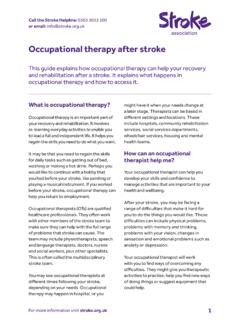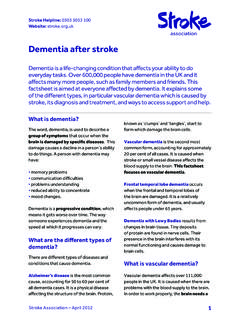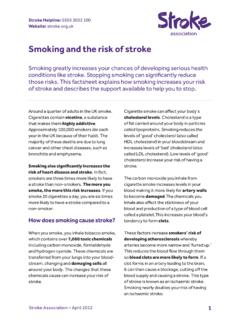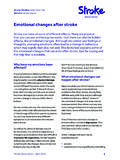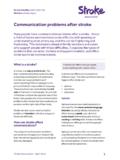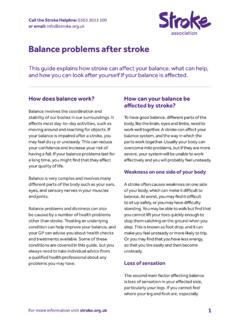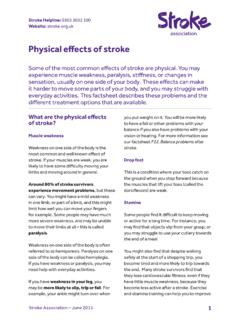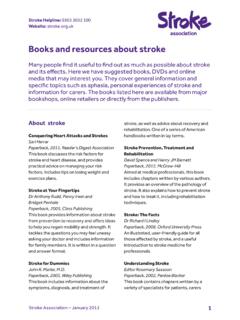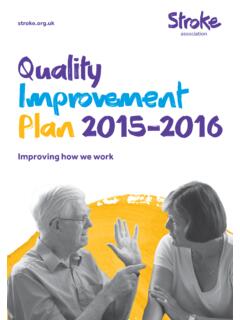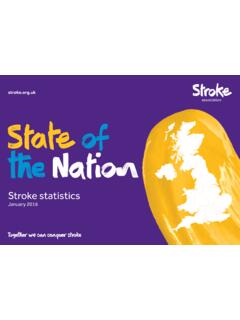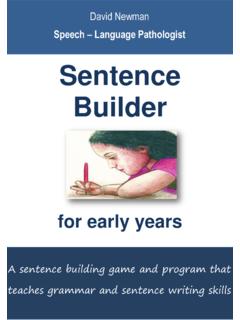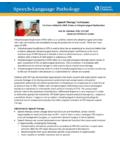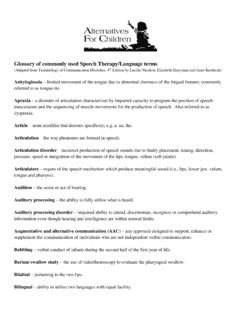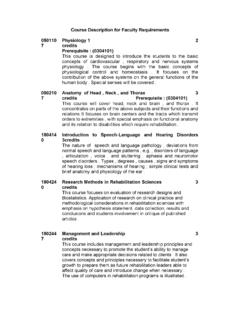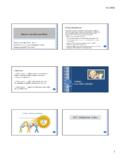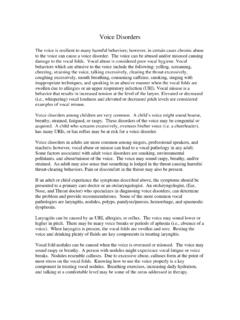Transcription of Speech and language therapy after stroke
1 stroke Helpline: 0303 3033 100 Website: and language therapy after strokeSpeech and language therapy (SLT) can help if you have communication problems or swallowing problems after a stroke . Therapists work in hospitals and the community to assess your difficulties and offer rehabilitation. This factsheet explains how therapy can help, what it involves and how you can find additional support, including private Association April 20121 Communication and swallowing problems are both common after a stroke . It is estimated that around a third of people will have some level of communication difficulties (called aphasia or sometimes dysphasia) after a stroke . At least 40 per cent of stroke survivors will initially experience some difficulty swallowing, though many people recover their swallow quite quickly. Difficulties with communication can make it more difficult for you to get information and can affect your social relationships, independence and self-confidence.
2 Swallowing problems can put you at risk of infection and affect your enjoyment of and language therapy may be helpful if you have the following difficulties: swallowing including problems with coughing or choking when eating or drinking understanding language (called receptive aphasia) speaking, including speaking any words or saying the correct word (called expressive aphasia) forming words and Speech sounds due to weak muscles in your mouth (dysarthria) moving the muscles needed for Speech in the correct order and sequence (dyspraxia), or reading (dyslexia) or writing (dysgraphia).Some people have a combination of these problems. The most common one is aphasia and dysarthria more information about these difficulties please see our factsheets F3, Communication problems after stroke and F5, Swallowing problems after stroke . How can I see a Speech and language therapist? If you are in hospital, there should be a Speech and language therapy team you were not admitted to hospital, were sent home without seeing a therapist, stroke Association April 20122 Speech and language therapy after strokeor need further therapy when you have left hospital then your GP can refer you to a community Speech and language therapist.
3 You or your family or carer can also contact your local Speech and language therapy department directly. In these situations the first assessment usually takes place at your home or at an outpatient department of the local hospital. Sometimes a therapist or assistant may telephone you or a family member for further information before your first appointment is does therapy involve? Speech and language therapists assess people with communication difficulties and help people to overcome and/or adapt to a range of communication problems. They also assess people who have swallowing problems and advise on safe ways to eat and drink. Your therapist s aim will be to work with you and your family and carer. therapy can minimise the impact of your difficulties and improve your should ideally have a specialist assessment of your swallowing within 24 hours of going into hospital. There are different swallow tests, for example one involves watching you swallowing 50 ml of water.
4 Swallowing assessments may also be done by another trained professional, such as a nurse. You may have a test called a video-fluoroscopy. This involves making an x-ray video where you swallow a solution that will show up on the x-ray. This will show your Speech and language therapist exactly how your swallowing has been affected by your stroke . If you have problems swallowing your normal diet, your Speech and language therapist may assess you with foods that taste different or are a different temperature, or with a fizzy therapist should design and monitor a swallowing rehabilitation programme for you. This should include compensatory strategies such as changing your posture ( tucking your chin in) or different swallowing manoeuvres and techniques to improve your swallowing, such as head-lifting exercises. They can also give you advice on what foods are easier to swallow, what to avoid and what to do if you choke.
5 Your carer, if you have one, should also be trained to recognise and manage your swallowing difficulties. Communication The aim of therapy is to help you to recover as much of your Speech as possible and/or find alternative ways of communicating. Your personal goals will probably be different depending on factors like your age and whether or not you are working. You are the expert in how your aphasia has affected you, and your therapist should involve you and your family in decisions about your treatment and , the Speech and language therapist will make an informal assessment of your general ability to communicate for example, how well you understand what is said to you, how difficult it is for you to express yourself and your general wellbeing. stroke Association April 20123 Speech and language therapy after strokeThis should be followed by a formal assessment. This may pick up problems which are not clear from talking to you.
6 It will help your therapist to establish a baseline to measure change against, and to design an individual programme of assessment should take into account your understanding of yes/no questions. For example, you might be asked questions like do you put your shoes on before your socks? You may be asked to describe your surroundings as a test of your spontaneous Speech or asked to repeat simple phrases or sounds. It is important that your assessment also takes into account factors unrelated to your stroke which can affect your communication such as previous problems with your vision or hearing, poorly fitting dentures or background distractions. A stroke may also cause new problems, including loss of vision or memory, that can make communication more is some overlap between the tasks you will be asked to do for assessment and therapy and your therapist should keep checking your progress as you work together.
7 The techniques your Speech and language therapist uses to help with your communication difficulties will depend on the particular problems you have. Therapies that target the specific area of communication you find difficult are most effective. For example, if you have difficulty understanding the meanings of words (receptive aphasia) you may be asked to match words to pictures, sort words according to their meaning and judge whether words have the same meaning. These activities aim to strengthen your ability to remember word meanings and link them to the spoken and written forms of words. If you have difficulty finding the words you want to say (expressive aphasia) your therapy might include practising naming pictures, judging whether words rhyme or not or repeating words your therapist says. Your therapist may provide prompts, for example, making the first sound of a word or writing the first letter for you.
8 They may also show you objects that you can touch and see whilst speaking their names. If you have weak muscles in your mouth, you may initially need to do exercises to help improve your muscle strength. Your Speech and language therapist may also give you advice on body positioning and where your tongue, lips and jaw should go when producing particular sounds. Difficulty controlling your breathing muscles can force you to take a breath in the middle of a sentence. Your Speech and language therapist may teach you breathing exercises and how to plan pauses within sentences to help with this. One approach to helping dyspraxia is to use natural melodic patterns for everyday phrases. For example, the phrase Good morning! , when said very cheerfully, has an almost musical melody. Your therapist can teach you to use this in an exaggerated way to co-ordinate your Speech . As your Speech improves, the melody and rhythm cues can be gradually Association April 20124 Speech and language therapy after strokeIf you have difficulty making the right sounds in the right order to form words, your therapy should include tasks such as listening to differences between spoken words, repeating words of increasing length and developing the ability to monitor your Speech .
9 Some people who can do tasks involving single words, such as naming pictures, have difficulty constructing sentences. Your therapy should also work on your ability to understand and produce simple and complicated sentences. An important part of the Speech and language therapist s role involves finding alternative or additional ways of communicating, which may include: gestures writing communication charts a letter board, or drawing. For some people an electronic communication aid may be beneficial. Again, your Speech and language therapist can advise on what would be helpful. (See our resource sheet R5, Electronic communication aids and software for more information.) Speech and language therapists are masters of non-verbal communication. They can give advice to family members on adapting communication to make it easier to understand. Because communication problems are often extremely difficult for stroke survivors to come to terms with, many Speech and language therapists also take on a counselling and writing If you have problems with Speech , it is quite likely that you will have problems with writing (dysgraphia), spelling and reading (dyslexia).
10 The areas of the brain which are important for these tasks are quite close together. therapy which helps with Speech may also help with reading and writing. This is because all ways of communicating use similar abilities; for example, finding the right words and constructing them into a sentence. However, if you have difficulty with one particular way of communicating, your therapy should focus on can my family help? When therapy starts, the therapist will usually give written instructions so that you and your family can practise specific exercises between sessions. It may be helpful if a family member can attend some therapy sessions to observe the exercises, and help you to practise problems can be frustrating and lonely for family and carers as well as for a person who has these difficulties. Your family should try to resist the temptation to do all the talking for you. Many people who have had a stroke are capable of understanding and producing Speech but their Speech may be slow at first.
